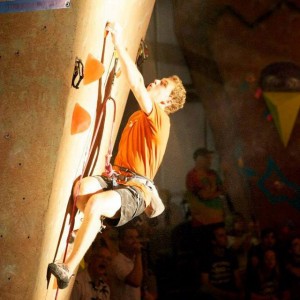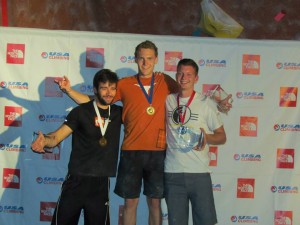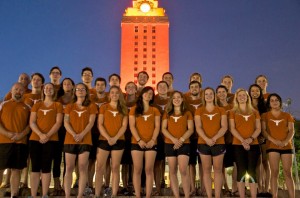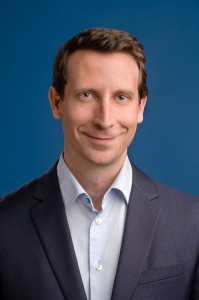 BHP senior, Will Butcher, has found a unique passion outside of his studies in the program: rock climbing. The Plano native is now president of Texas Rock Climbing team on campus, which became a UT affiliated organization just two years ago. Learn more about how Will has managed to juggle four majors (BHP, Finance, Plan II and Spanish) and lead the team to a national victories.
BHP senior, Will Butcher, has found a unique passion outside of his studies in the program: rock climbing. The Plano native is now president of Texas Rock Climbing team on campus, which became a UT affiliated organization just two years ago. Learn more about how Will has managed to juggle four majors (BHP, Finance, Plan II and Spanish) and lead the team to a national victories.
Why did you choose UT, and why did you specifically choose BHP?
I always thought about going to UT, because there is a long tradition of UT graduates in my family, including my older brother, my dad and both of my dad’s parents. After I found out that I had been accepted into both BHP and Plan II, I knew that I wanted to go to UT, because I was aware of the great reputation of both programs. I do not think that I could have chosen a better place to go to school than UT as a student in both BHP and Plan II.
How long have you been rock climbing?
 I have been climbing since I was nine years old. I got into climbing after I went to a summer camp at a climbing gym in Dallas called Exposure. The coach of the youth climbing team there invited me to join the team, and I begged my parents to let me on. I started competing with the team when I was 10 and have been climbing and competing ever since. Climbing has allowed me to travel around the country and around the world to compete, and I have had the honor to represent the U.S. in the Youth World Championships for climbing two times, first in Austria when I was 14, and again in Ecuador when I was 15. Before coming to UT, climbing on a team, training, and competing had been a huge part of my life for a long time, and I feel so fortunate to have been able to continue climbing and competing at UT. My freshman year at UT was the year the UT climbing team was established and the first year UT competed in the Collegiate Climbing Series, which was started in 2009 by John Myrick, who currently coaches the UT climbing team and has been coaching climbers in Austin for over a decade. UT currently has the largest climbing collegiate climbing team in the country and has had a very successful track record, winning all three consecutive National Championships it has competed in since the founding of the club team at UT.
I have been climbing since I was nine years old. I got into climbing after I went to a summer camp at a climbing gym in Dallas called Exposure. The coach of the youth climbing team there invited me to join the team, and I begged my parents to let me on. I started competing with the team when I was 10 and have been climbing and competing ever since. Climbing has allowed me to travel around the country and around the world to compete, and I have had the honor to represent the U.S. in the Youth World Championships for climbing two times, first in Austria when I was 14, and again in Ecuador when I was 15. Before coming to UT, climbing on a team, training, and competing had been a huge part of my life for a long time, and I feel so fortunate to have been able to continue climbing and competing at UT. My freshman year at UT was the year the UT climbing team was established and the first year UT competed in the Collegiate Climbing Series, which was started in 2009 by John Myrick, who currently coaches the UT climbing team and has been coaching climbers in Austin for over a decade. UT currently has the largest climbing collegiate climbing team in the country and has had a very successful track record, winning all three consecutive National Championships it has competed in since the founding of the club team at UT.
What is your role within Texas Rock Climbing?
I took over as president of Texas Rock Climbing my sophomore year, becoming the second president of the club, which had just become an official sport club at UT the preceding fall. I was president of the club for two years before handing the reins over to my successor this past spring. As president, I led a group of eight other officers who helped manage the club of 50 active members. We hold practices four days each week at the Austin Rock Gym and at the Gregory Gym climbing wall. Practices involve climbing, strength training and running. As a club we volunteer for local youth climbing competitions and participate in trail-building projects at climbing areas around Austin, like Reimers Ranch and Enchanted Rock. We also host two competitions each year, and our spring competition is a Collegiate Climbing Series competition that counts toward the regional score for CCS competitors and teams.
Texas Rock Climbing took first place at the National Collegiate Climbing Series in 2012, 2013 and 2014. How did it feel to have the UT tower lit in honor of the team’s accomplishments?
 Lighting up the Tower is one of the proudest moments a UT student can have! It is such an honor to see the Tower burning orange because of an achievement you had a hand in. Coming from a line of UT alumni, I have a strong sense of the value of UT traditions, and my family was incredibly excited to see the climbing team light up the Tower. Looking back on my time with the UT climbing team, I am so proud of all of the hard work of our team members and the amazing bond that has formed among team members, and I am honored to feel that I had a role in building the team and so grateful to have formed those connections and had so much fun doing something I love. UT is full of talented people who are successful in a wide range of pursuits, and I hope that Texas Rock Climbing will continue a legacy of climbing success at UT for many years to come.
Lighting up the Tower is one of the proudest moments a UT student can have! It is such an honor to see the Tower burning orange because of an achievement you had a hand in. Coming from a line of UT alumni, I have a strong sense of the value of UT traditions, and my family was incredibly excited to see the climbing team light up the Tower. Looking back on my time with the UT climbing team, I am so proud of all of the hard work of our team members and the amazing bond that has formed among team members, and I am honored to feel that I had a role in building the team and so grateful to have formed those connections and had so much fun doing something I love. UT is full of talented people who are successful in a wide range of pursuits, and I hope that Texas Rock Climbing will continue a legacy of climbing success at UT for many years to come.
What is your favorite part about the sport of rock climbing?
Rock climbing is not just a hobby to me. Climbing has been a passion for me, and my experiences with climbing have profoundly shaped who I am as a person. The things I have learned through climbing carry over into all aspects of my life. Through climbing, I learned the meaning of dedication and hard work, how to visualize success and overcome obstacles, how to step out of my comfort zone, how to handle both success and failure, how to have fun and enjoy the present while staying intensely focused and motivated, and so many other lessons that have helped me become who I am.
One of my favorite parts about climbing is that it takes you all kinds of places that you would never visit otherwise. Climbing has allowed me to travel around the world and to experience beautiful natural areas and a diverse set of people drawn together by their passion for climbing.
Besides rock climbing, what are you passionate about?
I am currently writing my Plan II senior thesis, and I have had the opportunity to study microfinance in-depth. Since freshman year, I have been drawn to thinking about how business can do good for the world, and I became interested in the idea of social entrepreneurship. The tension between the profit-motive and social responsibility has been a concept I have spent a lot of time thinking about at UT, with many of my classes providing new viewpoints from which to view the issue. Microfinance proposes to offer a win-win solution to world poverty while also profiting investors. In this way, microfinance offers an example of how capitalism can be used for social good beyond the goal of maximizing wealth creation. My thesis will examine microfinance and will seek to understand how microfinance might or might not play a role in sustainable economic development in developing countries around the world. I will travel to Ecuador in August to conduct research for my thesis, which I will complete this December.
What has been your favorite BHP course and why?
My favorite BHP course was MIS with Konana my freshman year. It was my first experience of what BHP classes were like, and I remember feeling excited that my classes would be all of the things that I had hoped for: rigorous yet engaging, filled with eager and intelligent peers, and taught by outstanding faculty. I had a lot of fun solving challenging problems in Excel and learning valuable analytical skills right away freshman year.
What are your plans for after you leave the 40 Acres?
This summer, I will be an investment banking analyst at Jefferies in Houston. I am really excited for the summer, and I plan to pursue a full-time analyst position to begin next year after graduation.

